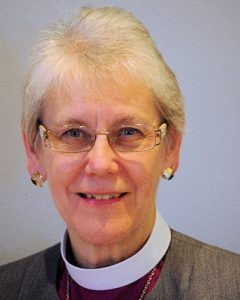
Although I in a townhouse and am able to grow plants only in pots, I enjoy gardening, watching with anticipation the emerging growth and blooms in each season. The task I find most difficult is pruning—cutting away the dead branches and reducing even some that are growing in order to strengthen the health of the plant overall. It is the task at the heart of John 15:2: “God cuts off every branch in me that bears no fruit, while every branch that does bear fruit he prunes so that it will be even more fruitful.”
This is the image that has been sitting in my heart over the past few months as I have contemplated the revelations about unmarked burial sites at former residential schools. The Church is being pruned. We did not bear healthy fruit; we bore poisoned fruit that contributed to the destruction of families and the embedding of intergenerational trauma. We must look at the actions of our ancestors in the faith—their participation in government policies and their tendency (a legacy of colonization) to not consider the dignity of the children in their care worth preserving. Poignantly, this is not just about the attitudes of a society toward people it considered outsiders; it is also about how our church viewed the lives and dignity of children who were among its own baptized members. The conviction of superiority that permeated colonial decisions and structures also permeated our church. Our church did not live into the faith it professed, nor its commandment to love neighbour as self. The few voices raised in protest were ignored or silenced.
These revelations are hard to hear or understand from our perspective today. We stand before the pain of Indigenous parents and communities, being pruned of any lingering sense of superiority. We did not see the disconnection between the faith we professed and our actions against the children and their families. Although we want to distance ourselves from our ancestors, we know we have absorbed attitudes that live in us until we choose to change them.
We cannot change the actions of the past, but we can examine ourselves today and ask whether that old blindness continues to exist in our relationships now—and assist in every way possible to redress the pain it caused. We can ask how the gospel is calling us to new relationships, especially with the emerging Sacred Circle Indigenous church. We can invite the Holy Spirit to be our guide in opening our hearts and minds. We can examine ourselves in light of the baptismal covenant to ask how we will respect the dignity of every human being and seek peace and justice in the world.
We will work with Indigenous families and communities in archival searches for information that will assist in the identification of missing children. We will support families and communities in the path they choose to take to bring the children home, either in body or spirit.
When my predecessor, Archbishop Fred Hiltz, made the apology for spiritual harm at General Synod 2019, he spoke repeatedly about the sins of our church in denying the culture, suppressing the language and forbidding the spiritual practices of Indigenous people, and about our church’s refusal to recognize the presence of the Creator in Indigenous communities and persons. We must tell our history with honesty about that sin—and change. We are being pruned. Let it be our prayer that new growth will bring healthy fruit.





